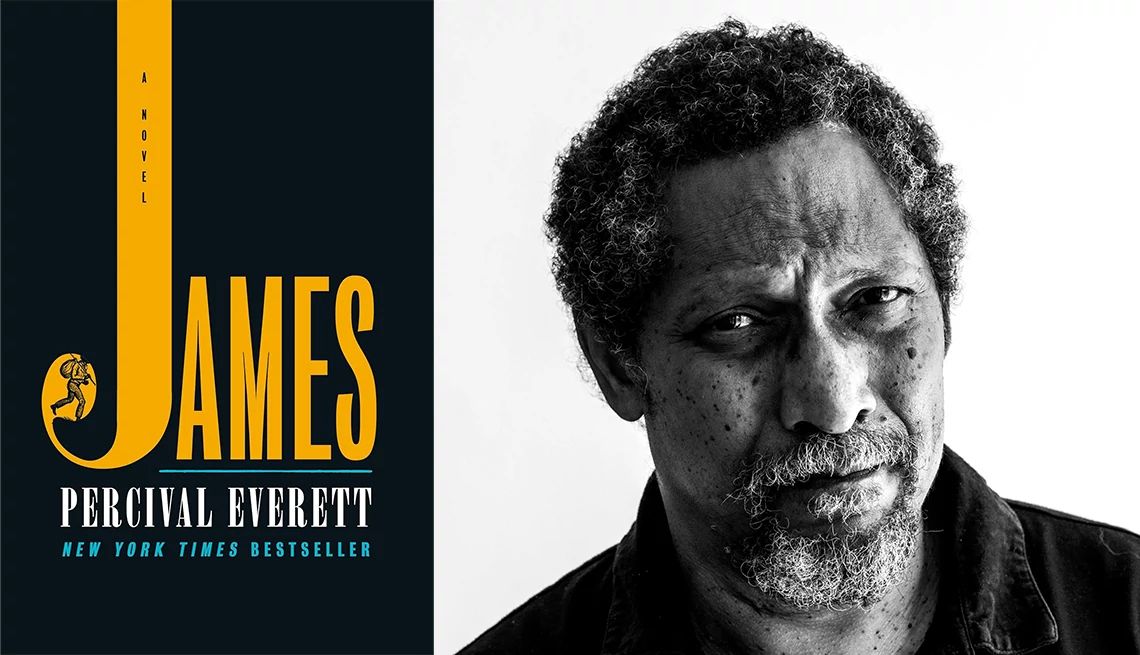
An interview with 'james' author, percival everett | members only
- Select a language for the TTS:
- UK English Female
- UK English Male
- US English Female
- US English Male
- Australian Female
- Australian Male
- Language selected: (auto detect) - EN
Play all audios:

The most widely admired novel of 2024? That would be _James_ by Percival Everett, hands down. Everett’s brilliant bestselling story won the 2024 Kirkus Prize and the National Book Award for
Fiction, was on the shortlist for the Booker Prize, and made pretty much every critic’s “best books of the year” list (including AARP’s). And Steven Spielberg has signed on to
executive-produce the film adaptation for Universal Pictures. If you’ve yet to read it, _James_ revisits Mark Twain’s _Adventures of Huckleberry Finn_ from the perspective of the enslaved
Jim (_James_, actually), who flees town when he hears he’s set to be sold and sent to New Orleans. Joined by Huck, also on the run and presumed dead, he begins a wild journey down the
Mississippi in a story full of wry social critique (Jim hides his fierce intelligence and eloquence when in the presence of white people), humor and suspense. “James” by Percival Everett is
an action-packed reimagining of “The Adventures of Huckleberry Finn,” told from the enslaved Jim's point of view. AARP (Penguin Random House) Listing it among its picks for the 10 best
books of 2024, the _New York Times _describes it as “a literary hat trick — a book that highlights the horrors in American history and complicates an American classic, all while also
emerging as a work of exquisite originality in its own right.” Everett, 66, a distinguished professor of English at the University of Southern California, has also written some two dozen
other books, including the 2001 novel _Erasure_, the basis for the Oscar-nominated 2023 film _American Fiction._ He joined Shelley Emling, the editor of _The Girlfriend__ _, AARP’s free
newsletter for Gen X women, for a live discussion about _James_ — a Girlfriend Book Club pick — and the writing life on Feb. 18. Here are some highlights from their chat. WHERE DID THE IDEA
FOR _JAMES_ COME FROM? Well, all novels come from the [writer’s] accumulated experience and place in the world — so, in that way, I couldn’t write it without those years. On the other hand,
it never occurred to me to try to tell a story from Jim’s point of view until I was playing tennis one day, and it just popped into my head. ARE YOU SURPRISED AT HOW READERS HAVE REACTED TO
THE NOVEL? Quite a bit. I thought it might do OK, but I didn’t think that people would become obsessed with it the way that happened. And again, it’s great. I wish all my books had this
reception, but it’s unexpected. HOW DIFFERENT WAS IT TO RESEARCH AND WRITE _JAMES _COMPARED TO YOUR OTHER BOOKS? My work is often research-heavy, so it was very different. It was not
possible for me to travel back to 1850 and see what it was like in the Antebellum Southern U.S., and I had never worked with an extant story before. I wanted to inhabit that world, but I
wanted not to feel any loyalty to the text, so my research became reading _Huck Finn_ 15 times … And the frustrating thing was that at the end of time 15, I realized that I only needed to do
that 10 times.
